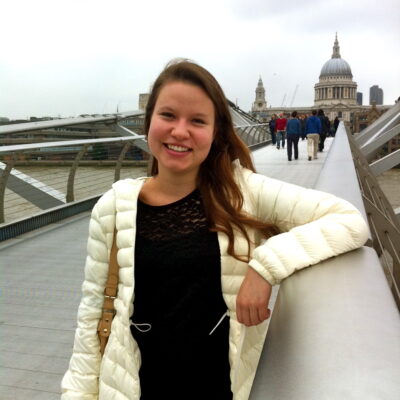Having graduated in Spring of 2014, Eviane then received her Master’s at the University of Bristol in the UK before joining the newly founded Center for Research on Extremism at the University of Oslo (http://www.sv.uio.no/c-rex/english/) as their first PhD fellow this autumn. Her research project, ‘The Paradox of Hindu Right-Wing Extremism: Populist Discourse, Elitist Support, is the first in-depth study of Hindu right-wing ideology in the extremism field.
Eviane previously studied abroad at King’s College London AY 2012-13, during which time she interned at a political non-profit, ENGAGE, which aims to increase political engagement amongst British Muslims, and also was a researcher at Cambridge House, an established charity that provides local social support services. Her undergraduate career at Berkeley culminated in a Teaching Assistant position for a course in Peace and Conflict Studies, as well as assisting with events at the UC Berkeley Consortium for Interdisciplinary Research (the administrative center for the Program in Critical Theory and the Berkeley Center for the Study of Religion).
Eviane writes that she is “grateful for the ISF major in allowing for a highly personalised programme of study, both abroad and at Berkeley. This accommodation fosters students to be well-organised and intellectually rigorous.”
Eviane encourages study abroad courses and provides us with this abstract for her 2014 thesis (Mis)representation of Delhi’s Muslim Ghettos:
The purpose of this paper is to examine the Indian Muslim community and specifically the representation of Muslim ghettos in Delhi. Delhi as an urban space has been simultaneously a historical locality and vision for Indias future. With independence, Nehru envisioned a modern India with Delhi as the heart of the new nation. Yet, Partitions impact is still felt in Delhis spaces. I argue that rampant ghettoistion in the capital, especially within Muslim neighbourhoods, is the consequence of government neglect and institutional bias against the Muslim community. This paper emphasises the publication of the Rajindar Sachar Committee report in 2006, which identifies Muslims as socially, economically, politically, and culturally backward. A theme present within the RSC report, the prevalent and increasing ghettoisation of Muslims, has ensconsed their marginalised position. Special attention is paid to the Jamia Nagar neighbourhood in Delhi, which serves as a case study. Media representations of Jamia Nagar were collected via content analysis of two major daily newspapers (The Times of India and The Indian Express) from archives dating 2009-2014. This representation of Delhis Muslim ghettos has influenced public policy decisions regarding the greater Muslim community. I conclude that state institutions and media participate in an environment that legitimises negative representations and categorisations of Muslims.
